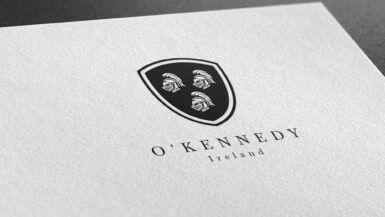The surname Andrews, much like its close counterpart Anderson, signifies “son of Andrew.” The name, owing to the widespread veneration of Saint Andrew, a key apostle in Christian tradition, has its roots deeply embedded in early Christian Europe.
Etymology and Meaning
The name Andrew is derived from the Greek word “Andreas”, meaning “manly” or “brave”. Over time, the name became associated with Saint Andrew, the first disciple of Christ, leading to its widespread adoption throughout Christian communities in Europe.
Earliest Known Usage
Records suggest that the use of Andrews as a surname began in medieval England and Scotland. As with many surnames of the era, it was patronymic, indicating lineage. Its entry into Ireland is believed to have been facilitated by the Anglo-Norman conquest and later strengthened by the Scottish settlers during the Plantation of Ulster.
Geographic Distribution
Within Ireland, the Andrews name found strongholds in the province of Ulster, particularly in counties like Antrim and Down. As time progressed, the name became more widespread, seeping into the heartlands of Ireland.
Original Geographic Location
Though the first usage of Andrews is often attributed to England and Scotland, its true origin lies in the early Christian communities of the Eastern Roman Empire, from where the veneration of Saint Andrew spread westward.
Migration Patterns
The Andrews families, particularly those of Ulster origin, were part of the broader migratory wave from Ireland during the 18th and 19th centuries. Many sought new horizons in North America, Australia, and other parts of the British Empire, especially during periods of economic hardship like the Great Famine.
Historical Context
Notable Historical Events
Being primarily settled in Ulster, families bearing the Andrews name were embroiled in the region’s tumultuous events, from the Nine Years’ War to the Williamite War in the late 17th century.
Involvement in Key Moments in History
Throughout the centuries, Andrews families played roles – sometimes major, sometimes minor – in the tapestry of Irish history. From participating in rebellions against English rule to advocating for Irish rights during the Home Rule movement, their involvement was diverse.
Notable Irish Bearers of the Surname
Famous Individuals
- Thomas Andrews – Born in Belfast, he was the chief designer of the RMS Titanic. Despite the tragic end, his work on ship design left a lasting legacy in maritime engineering.
Influential Figures
The Andrews surname has made notable contributions in various arenas in Ireland. From shipbuilding magnates to politicians, their influence has been both varied and profound.
Variations of the Surname
Spelling Variations
While Andrews is the most common spelling, variations such as Androws, Androes, or even the simpler form, Andrew, can be found in historical records.
Regional Differences
In areas of Ireland where Gaelic held sway, the Andrews surname sometimes underwent Gaelicization in pronunciation, though the written form remained largely consistent.
Current Statistics and Distribution
Frequency and Global Distribution
Given the large diaspora, the Andrews name can now be found in many corners of the globe. Within Ireland, its distribution, once focused in Ulster, has broadened over time, reflecting both internal movements and intermarriage.
Changes Over Time
The Andrews surname has seen an evolution in its standing within Ireland. From being settlers in a new land to being integrated members of the Irish socio-political fabric, the journey of the name reflects broader historical currents.
Family Coat of Arms
The Andrews family coat of arms typically portrays a silver shield with a chevron between three cross-crosslets, symbolizing Christian faith. The crest often features a stag, indicative of peace and harmony. The motto, “Virtute Ex Alto”, translates to “By virtue from on high”, reflecting the family’s Christian roots.






Leave a reply